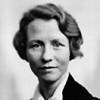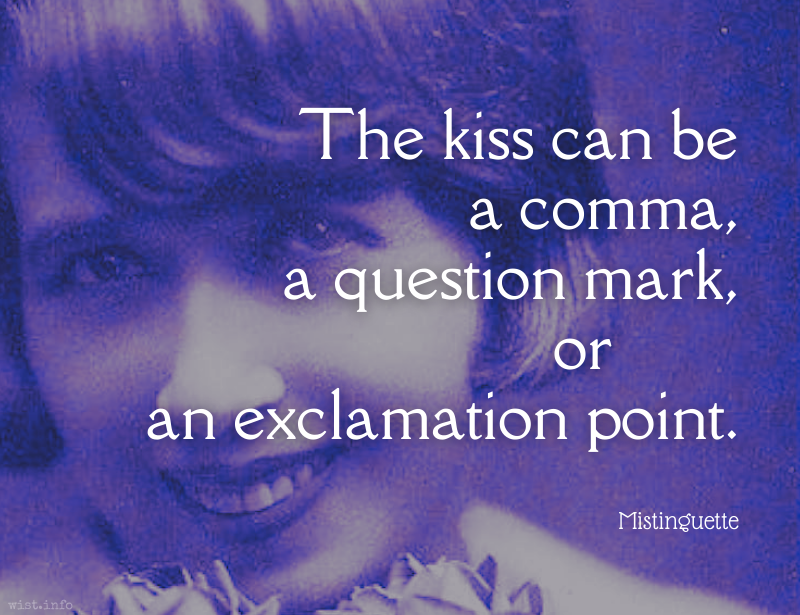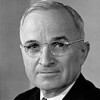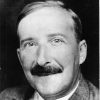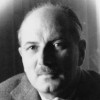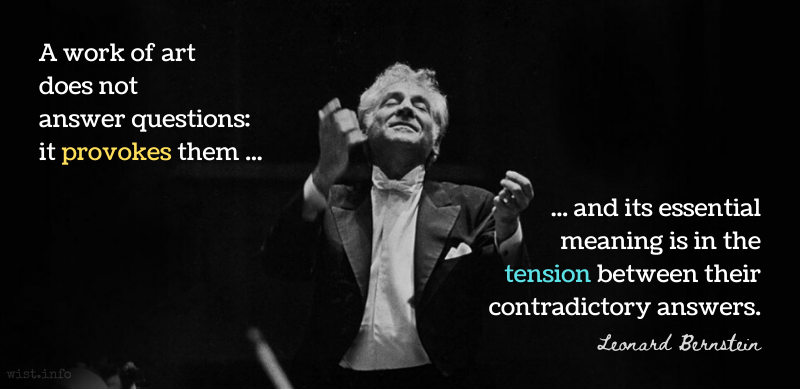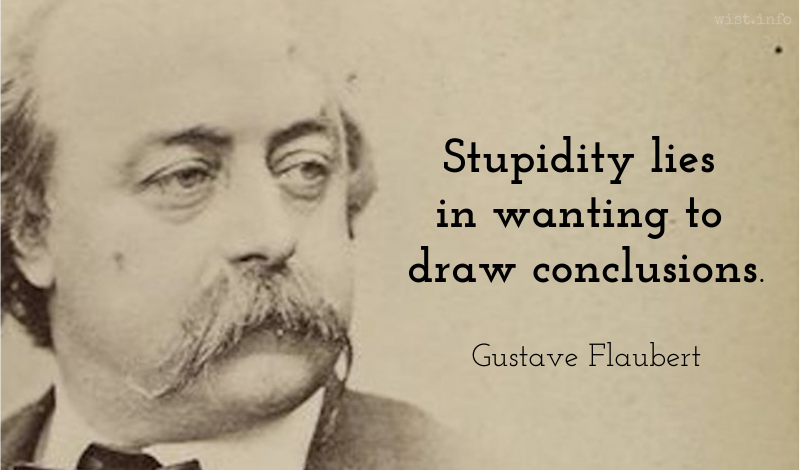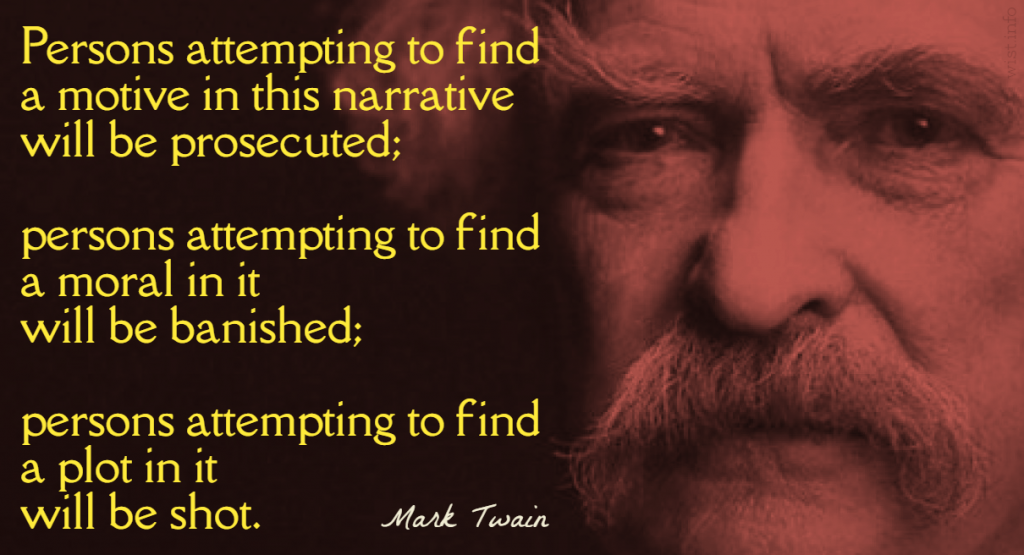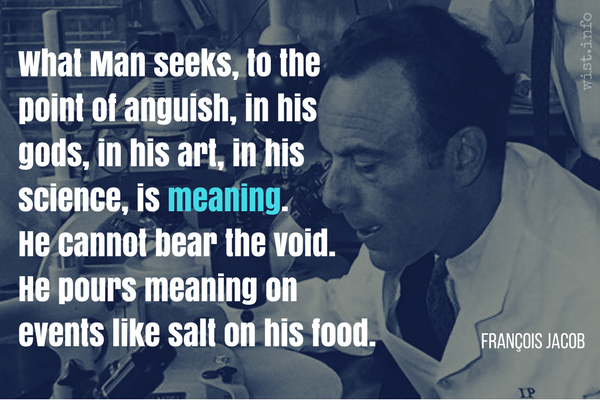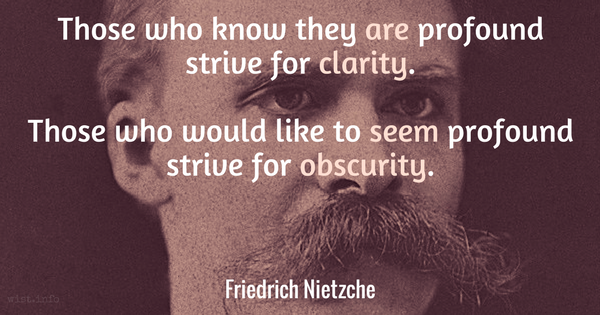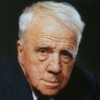The uses of a dictionary: at thirteen we look up lewd, licentious, lascivious; at thirty, febrile and inchoate; at fifty, endostosis.
Mignon McLaughlin (1913-1983) American journalist and author
The Neurotic’s Notebook, ch. 10 (1963)
(Source)
Quotations about:
meaning
Note not all quotations have been tagged, so Search may find additional quotes on this topic.
Life in itself
Is nothing,
An empty cup, a flight of uncarpeted stairs.
But not only creativeness and enjoyment are meaningful. If there is a meaning in life at all, then there must be a meaning in suffering. Suffering is an ineradicable part of life, even as fate and death. Without suffering and death human life cannot be complete.
Viktor Frankl (1905-1997) German-American psychologist, writer
Man’s Search for Meaning [Trotzdem Ja zum Leben Sagen], Part 1 (1946) [tr. Lasch (1959)]
(Source)
Historical sense and poetic sense should not, in the end, be contradictory, for if poetry is the little myth we make, history is the big myth we live, and in our living, constantly remake.
Robert Penn Warren (1905-1989) American poet, novelist, literary critic
Brother to Dragons, Foreword (1953)
(Source)
Listen, are you breathing just a little and calling it a life?
Mary Oliver (1935-2019) American poet
“Have You Ever Tried to Enter the Long Black Branches?” West Wind (1997)
(Source)
You know not, will not know, what Christians are;
Their pride is to be Christians, never men;
Ay, even that which since their Founder’s time
Hath tinged their superstition with a touch
Of pure humanity, is prized by them
Never because ’tis human, but because
‘Twas preached and practised by their Jesus Christ.
‘Tis well for them he was so rare a man;
Well that they take his virtues upon trust;
But what to them the virtues of their Christ?
‘Tis was not his virtues, but his name alone
They seek to spread, that it may dominate
And cloud the names of other noble men;
Ay, ’tis the name, the name of Christ alone
Your Christian cares about.[Du kennst die Christen nicht, willst sie nicht kennen.
Ihr Stolz ist: Christen sein; nicht Menschen. Denn
Selbst das, was, noch von ihrem Stifter her,
Mit Menschlichkeit den Aberglauben würzt,
Das lieben sie, nicht weil es menschlich ist:
Weil’s Christus lehrt; weil’s Christus hat getan.—
Wohl ihnen, daß er so ein guter Mensch
Noch war! Wohl ihnen, daß sie seine Tugend
Auf Treu und Glaube nehmen können!—Doch
Was Tugend?—Seine Tugend nicht; sein Name
Soll überall verbreitet werden; soll
Die Namen aller guten Menschen schänden,
Verschlingen. Um den Namen, um den Namen
Ist ihnen nur zu tun.]Gotthold Lessing (1729-1781) German playwright, philosopher, dramaturg, writer
Nathan the Wise [Nathan der Weise], Act 2, sc. 1 [Sittah] (1779) [tr. Maxwell (1917)]
(Source)
(Source (German)). Alternate translations:
You do not know the christians.
You will not know them. 'Tis this people's pride
not to be men, but to be christians. Even
what of humane their founder felt, and taught,
and left to savour their fond superstition,
they value not because it is humane,
lovely, and good for man; they only prize it
because 'twas Christ who taught it, Christ who did it.
'Tis well for them he was so good a man:
well that they take his goodness all for granted,
and in his virtues put their trust. His virtues --
'Tis not his virtues, but his name alone
they wish to thrust upon us. -- 'Tis his name
which they desire should overspread the world,
should swallow up the name of all good men,
and put the best to shame. Tis his mere name
they care for --
[tr. Taylor (1790)]
Thou dost not know the Christians, wilt not know them.
Their pride, that is: the Christian; not the Man.
For even what, still coming from their founder,
With human worth, imbibes their superstition,
Is not adored by them, because 'tis human:
No, but because Christ taught, Christ acted so. --
'Tis well for them, that yet so good a man
He was! 'Tis well for them, that they may take
His virtue granted, and on faith! -- But what
Of virtue! -- Not his Virtue; no, his Name
They wish to spread all o'er the world; his name
Shall stigmatize the names of all good men,
And swallow them. The name, and but the name, --
That's what they cherish.
[tr. Reich (1860)]
You do not, will not, know the Christian race.
It is their pride not to be men, but Christians.
The virtue which their founder felt and taught,
The charity He mingled with their creed,
Is valued, not because it is humane,
And good, and lovely, but for this alone,
That it was Christ who taught it, Christ who did it.
;Tis well for them He was so good a man.
Well that they take His goodness all on trust.
And in His virtues put their faith. His virtues!
'Tis not His virtues, but His name alone
They wish to thrust upon us -- His mere name,
Which they desire should overspread the world,
Should swallow up the name of all good men.
And put the rest to shame. 'Tis for His name
Alone they care.
[tr. Boylan (1878)]
Thou knowest not the christians, will'st not know them:
Their pride is to be Christians, and not men.
For even that which from their Founder's time
Seasons their superstition with humanity, --
That love they not because 'tis human; -- no,
Because Christ taught it and Christ practised it.
'Tis well for them that he was really such
A good man! Well, that they can take on trust
His virtue! Yet what speak I of his virtue?
'Tis not his virtue, 'tis his name alone,
That over all the earth shall spread abroad,
To put to scorn and swallow up the name
Of every other good man. 'Tis the name,
The name alone they care for, they.
[tr. Corbett (1883)]
Thou knowest the Christians not -- wilt not know them.
Their pride is to be Christians -- not men. For
Even that humanity, which by their Founder
Was rooted in their superstition, that love they
Not because it is humane, but because
He taught it -- because so Christ hath done.
Tis well for them He was indeed so
Good a man. 'Tis well for them that they
His virtue can accept on faith, and on belief.
His virtue say I? Not His virtue. His name alone
Shall over all be spread, and shall the name
Of all good men shame and destroy. The name --
And nothing but the name -- is their concern.
[tr. Jacks (1894)]
You do not know the Christians, don’t want to know them. Their pride is to be Christians, not men. Because even what leavens superstition with mitigating aspects, -- dating back to their founder -- they don’t love because it is human. (They love it) because Christ teaches it, because Christ has done it. Lucky they that such a good man existed yet! Lucky they that they can take his virtue on faith and belief! But what virtue? Not his virtue, his name is to be propagated everywhere, is to desecrate the name of all good men, devour it. For the name, for the name only, they care.
[tr. Reinhardt (1950)]
You do not know the Christians, will not know them.
Their pride is to be Christians, and not men.
For even that which from their Founder’s day
With human nature spices superstition
They don’t love for its human worth: because
Their Jesus taught it, by him it was done. --
O well for them, that he was a good man!
And well for them, that they can take his virtue
On faith! -- But what of virtue? -- It’s not that
Shall overspread the world, but just his name;
That name shall swallow all the names of men,
Put them to shame. The name, the name alone,
Is all they care for.
[tr. Morgan (1955), l. 72ff]
You don't know Christians, and you'll never know them. Their pride's not to be men, its to be Christians. Even humanity -- which from the days of their dear Lord Jesus Christ has lessened superstition -- they love, not for its human quality, but only because Christ taught it and showed it in His deeds. It is indeed a blessing that He was so good a man, a man in whose virtues they can place their entire faith! But are His virtues really theirs? No, not at all, it's not His virtues but His name that they attempt to spread throughout the world and, in so doing, cloud with slander and obliterate the names of all good men. The name alone is everything to these Christians.
[tr. Ade (1972)]
It is the function of art to renew our perception. What we are familiar with we cease to see. The writer shakes up the familiar scene, and as if by magic, we see a new meaning in it.
Anaïs Nin (1903-1977) Catalan-Cuban-French author, diarist
The Novel of the Future, ch. 2 “Abstraction” (1968)
(Source)
And yet if there’s one thing consistent about language it is that it is constantly changing. The only languages that do not change are those whose speakers are dead.
Rosalie Maggio (1944-2021) American writer
Unspinning the Spin: The Women’s Media Center Guide to Fair and Accurate Language, “Writing Guidelines / Introduction” (2014)
(Source)
This is sometimes attributed to Maggio's earlier The Bias-Free Word Finder (1992), but only the first sentence is present in that version.
The source link is to the web page that the WMC set up for the book.
The Constitution and the Declaration of Independence can live only as long as they are enshrined in our hearts and minds. If they are not so enshrined, they would be no better than mummies in their glass cases, and they could in time become idols whose worship would be a grim mockery of the true faith. Only as these documents are reflected in the thoughts and acts of Americans can they remain symbols of a power that can move the world.
Come to think of it, I don’t know that love has a point, which is what makes it so glorious. Sex has a point, in terms of relief and, sometimes, procreation, but love, like all art, as Oscar said, is quite useless. It is the useless things that make life worth living and that make life dangerous too: wine, love, art, beauty. Without them life is safe, but not worth bothering with.
Stephen Fry (b. 1957) British actor, writer, comedian
Moab Is My Washpot, “Falling In,” ch. 6 (1997)
(Source)
Referencing Oscar Wilde from the preface of The Picture of Dorian Gray (1890): "All art is quite useless".
Oh, if at every moment of our lives we could know the consequences of some of the utterings, thoughts and deeds that seem so trivial and unimportant at the time! And should we not conclude from such examples that there is no such thing in life as unimportant moments devoid of meaning for the future?
Isabelle Eberhardt (1877-1904) Swiss-Russian explorer and author [Si Mahmoud Saadi]
The Passionate Nomad: The Diary of Isabelle Eberhardt , “26 November 1901” (1987)[tr. de Voogd]
(Source)
Hard work is a prison sentence only if it does not have meaning. Once it does, it becomes the kind of thing that makes you grab your wife around the waist and dance a jig.
Malcolm Gladwell (b. 1963) Anglo-Canadian journalist, author, public speaker
Outliers: The Story of Success, Part 1, ch. 5, sec. 10 (2008)
(Source)
The three horrors of modern life — talk without meaning, desire without love, work without satisfaction.
Mignon McLaughlin (1913-1983) American journalist and author
The Neurotic’s Notebook, ch. 5 (1963)
(Source)
Never try to convey your idea to the audience — it is a thankless and senseless task. Show them life, and they’ll find within themselves the means to assess and appreciate it.
Art is born and takes hold wherever there is a timeless and insatiable longing for the spiritual, for the ideal: that longing which draws people to art. Modern art has taken the wrong turn in abandoning the search for the meaning of existence in order to affirm the value of the individual for his own sake.
Andrei Tarkovsky (1932-1986) Russian film director, screenwriter, film theorist [Андрей Арсеньевич Тарковский]
Sculpting in Time (1986) [tr. Hunter-Blair]
(Source)
In all such oaths we are not to attend to the mere form of words, but the true design and intention of them.
[Semper autem in fide quid senseris, non quid dixeris, cogitandum.]
Marcus Tullius Cicero (106-43 BC) Roman orator, statesman, philosopher
De Officiis [On Duties; On Moral Duty; The Offices], Book 1, ch. 13 (1.13) / sec. 40 (44 BC) [tr. Cockman (1699)]
(Source)
(Source (Latin)). Alternate translations:
In obligations of faith, it is the meaning always, not the words that are to be considered.
[tr. McCartney (1798)]
In a promise, what you thought, and not what you said, is always to be considered.
[tr. Edmonds (1865)]
In a promise, what you mean, not what you say, is always to be taken into account.
[tr. Peabody (1883)]
A promise must be kept not merely in the letter, but in the spirit.
[ed. Harbottle (1906)]
In the matter of a promise one must always consider the meaning and not the mere words.
[tr. Miller (1913)]
You should always, in a matter of trust, think of what you mean, not of what you say.
[tr. Edinger (1974)]
KEATING: When you read, don’t just consider what the author thinks, consider what you think.
History, we can confidently assert, is useful in the sense that art and music, poetry and flowers, religion and philosophy are useful. Without it — as with these — life would be poorer and meaner; without it we should be denied some of those intellectual and moral experiences which give meaning and richness to life. Surely it is no accident that the study of history has been the solace of many of the noblest minds of every generation.
Henry Steele Commager (1902-1998) American historian, writer, activist
The Nature and Study of History, ch. 5 (1965)
(Source)
We were entrusted to one another, in the days which mattered, Clare thought. Entrusted to one another by chance, not choice. Chance, and its agents time and place. Chance is better than choice; it is more lordly. In its carelessness it is more lordly. Chance is God, choice is man. You — she thought, looking at the bed — chanced not chose to want us again.
Elizabeth Bowen (1899-1973) Irish author
The Little Girls, ch. 7 (1964)
(Source)
Quoted, in abbreviated form, in the foreword to her Pictures and Conversations (1975):
Chance is better than choice; it is more lordly. Chance is God, choice is man.
Clarity of language is the first casualty of authoritarianism.
Robin Morgan (b. 1941) American poet, author, activist, journalist
“Saving the World,” Ms. (Summer 2003)
(Source)
The great wisdom traditions of the world all recognize that the main impediment to living a life of meaning is being self-absorbed.
Barbara Brown Taylor (b. 1951) American minister, academic, author
An Altar in the World, ch. 6 (2009)
(Source)
A faith is dead when no one can think of a heresy.
James Richardson (b. 1950) American poet
“Vectors: 56 Aphorisms and Ten-second Essays,” Michigan Quarterly Review, # 40 (Spring 1999)
(Source)
In the popular imagination, the belief persists that history involves little more than reconstruction, a retelling of the past “as it actually was.” But historical understanding involves far more than mere empiricism; it demands a readiness to draw back from the facts to reflect on their significance and their interconnection.
Peter E, Gordon (b. 1966) American intellectual historian
“Why Historical Analogy Matters,” New York Review of Books (7 Jan 2020)
(Source)
There is a lot of folklore about equestrian statues, especially the ones with riders on them. There is said to be a code in the number and placement of the horse’s hooves: If one of the horse’s hooves is in the air, the rider was wounded in battle; two legs in the air means that the rider was killed in battle; three legs in the air indicates that the rider got lost on the way to the battle; and four legs in the air means that the sculptor was very, very clever. Five legs in the air means that there’s probably at least one other horse standing behind the horse you’re looking at; and the rider lying on the ground with his horse lying on top of him with all four legs in the air means that the rider was either a very incompetent horseman or owned a very bad-tempered horse.
Such closet politicians never fail to assign the deepest motives for the most trifling actions; instead of often ascribing the greatest actions to the most trifling causes, in which they would be much seldomer mistaken. They read and write of kings, heroes, and statesmen, as never doing any thing but upon the deepest principles of sound policy. But those who see and observe kings, heroes and statesmen, discover that they have headaches, indigestions, humours, and passions, just like other people; every one of which, in their turns, determine their wills, in defiance of their reason.
Lord Chesterfield (1694-1773) English statesman, wit [Philip Dormer Stanhope]
Letter to his son, #205 (5 Dec 1749)
(Source)
It’s a blessing to die for a cause, because you can so easily die for nothing.
Andrew Young (b. 1932) American politician, diplomat, activist
Interview by Peter Ross Range, Playboy (Jul 1977)
(Source)
For even the humblest person, a day spent without the sight or sound of beauty, the contemplation of mystery, or the search for truth and perfection is a poverty-stricken day; and a succession of such days is fatal to human life.
Lewis Mumford (1895-1990) American writer, philosopher, historian, architect
The Condition of Man (1944)
(Source)
Words are like Leaves; and where they most abound,
Much Fruit of Sense beneath is rarely found.
A work of art does not answer questions: it provokes them; and its essential meaning is in the tension between their contradictory answers.
Leonard Bernstein (1918-1990) American conductor, composer, author, music lecturer, pianist
“A Sabbatical Report,” sec. 1, New York Times (24 Oct 1965)
(Source)
Reprinted in The Infinite Variety of Music (1966)
Every word is a messenger. Some have wings; some are filled with fire; some are filled with death.
You can have the other words — chance, luck, coincidence, serendipity. I’ll take grace. I don’t know what it is exactly, but I’ll take it.
ANTON EGO: In many ways, the work of a critic is easy. We risk very little, yet enjoy a position over those who offer up their work and their selves to our judgment. We thrive on negative criticism, which is fun to write and to read. But the bitter truth we critics must face, is that in the grand scheme of things, the average piece of junk is probably more meaningful than our criticism designating it so.
Stupidity lies in wanting to draw conclusions.
[L’ineptie consiste à vouloir conclure. […] Oui, la bêtise consiste à vouloir conclure.]
Gustave Flaubert (1821-1880) French writer, novelist
Letter to Louis Bouilhet (4 Sep 1850)
(Source)
The phrase is used twice in the letter. The initial phrase is usually translated to "foolishness" or "folly," the second to "stupidity."
what matters most is
how well you
walk through the
fire.
Persons attempting to find a motive in this narrative will be prosecuted; persons attempting to find a moral in it will be banished; persons attempting to find a plot in it will be shot.
— By Order of the AuthorMark Twain (1835-1910) American writer [pseud. of Samuel Clemens]
The Adventures of Huckleberry Finn, “Notice” (1884)
(Source)
What Man seeks, to the point of anguish, in his gods, in his art, in his science, is meaning. He cannot bear the void. He pours meaning on events like salt on his food. He denies that life bounces along at random, at the mercy of events, in sound and in fury. He wants it always to be directed, aimed toward a goal, like an arrow.
François Jacob (1920-2013) French biologist, Nobel prize winner in Medicine
The Statue Within: An Autobiography (1987) [tr. Philip (1988)]
(Source)
There may be no good reason for things to be the way they are.
Alain de Botton (b. 1969) Swiss-British author
The Consolations of Philosophy, ch. 1 “Consolations for Unpopularity,” sec. 4 (2000)
(Source)
This ideal University of Life … would never take the importance of culture for granted. It would know that culture is kept alive by a constant respectful questioning — not by an excessive and snobbish attitude of respect. Therefore, rather than leaving it hanging why one was reading Anna Karenina or Madame Bovary, an ideal course covering nineteenth-century literature would ask plainly “What is it that adultery ruins in a marriage?” Students in the ideal University of Life would end up knowing much the same material as their colleagues in other institutions, they would simply have learned it under a very different set of headings.
Alain de Botton (b. 1969) Swiss-British author
“Reclaiming the Intellectual Life for Posterity,” Liberal Education (Spring 2009)
(Source)
It should be quite unnecessary to point the moral; the right telling of the story should be sufficient. Do not moralize, but let the facts produce their own moral in the child’s mind.
Bertrand Russell (1872-1970) English mathematician and philosopher
Education and the Good Life, ch. 11 (1926)
(Source)
Those who know they are profound strive for clarity. Those who would like to seem profound strive for obscurity. For the crowd believes that if it cannot see to the bottom of something it must be profound. It is timid and dislikes going into the water.
[Tief sein und tief scheinen. — Wer sich tief weiss, bemüht sich um Klarheit; wer der Menge tief scheinen möchte, bemüht sich um Dunkelheit. Denn die Menge hält Alles für tief, dessen Grund sie nicht sehen kann: sie ist so furchtsam und geht so ungern in’s Wasser.]
Friedrich Nietzsche (1844-1900) German philosopher and poet
The Gay Science [Die fröhliche Wissenschaft], Book 3, § 173 (1882) [tr. Kaufmann (1974)]
(Source)
Also known as La Gaya Scienza, The Joyful Wisdom, or The Joyous Science. (Source (German)). Alternate translations:
To Be Profound and to Appear Profound. -- He who knows that he is profound strives for clearness; he who would like to appear profound to the multitude strives for obscurity. The multitude thinks everything profound of which it cannot see the bottom; it is so timid and goes so unwillingly into the water.
[tr. Common (1911)]
Being Deep and Seeming Deep. -- Those who know they are deep strive for clarity. Those who would like to seem deep to the crowd strive for obscurity. For the crowd takes everything whose ground it cannot see to be deep; it is so timid and so reluctant to go into the water.
[tr. Nauckhoff (2001)]
Being Profound and Being Thought Profound -- Whoever knows that he is profound strives for clarity; whoever would like the crowd to think he is profound strives for obscurity. The reason for this is that the crowd thinks something is profound whenever it cannot see to the bottom of it; it is afraid of the water and hates to get its feet wet.
[tr. Hill (2018)]
Being Deep and Appearing Deep -- Whoever knows he is deep, strives for clarity; whoever would like to appear deep to the crowd, strives for obscurity. For the crowd considers anything deep if only it cannot see to the bottom: the crowd is so timid and afraid of going into the water.
[Source]
Whoever knows himself to be deep strives for clarity; whoever wants to appear deep to the masses strives for obscurity. For the masses consider anything to be deep that they cannot see the bottom of.
[Source]
There is a difference between tragedy and blind brutal calamity. Tragedy has meaning, and there is dignity in it. Tragedy stands with its shoulders stiff and proud. But there is no meaning, no dignity, no fulfillment, in the death of a child.
Remember that you have only one soul; that you have only one death to die; that you have only one life, which is short and has to be lived by you alone; and there is only one Glory, which is eternal. If you do this, there will be many things about which you care nothing.
Don’t write so you can be understood. Write so that you cannot be misunderstood.
Quintilian (39-90) Roman orator [Marcus Fabius Quintilianus]
De Institutione Oratoria, Book 8, ch. 2, l. 24
Alt. trans.: "We should not write so that it is possible for [the reader] to understand us, but so that it is impossible for him to misunderstand us."
Also attributed to Epictetus, Francis Bacon, Robert Louis Stevenson, Ralph Waldo Emerson, and William Taft.
Elves are wonderful. They provoke wonder.
Elves are marvelous. They cause marvels.
Elves are fantastic. They create fantasies.
Elves are glamorous. They project glamour.
Elves are enchanting. They weave enchantment.
Elves are terrific. They beget terror.
The thing about words is that meanings can twist just like a snake, and if you want to find snakes look for them behind words that have changed their meaning.
No one ever said elves are nice.
Elves are bad.


